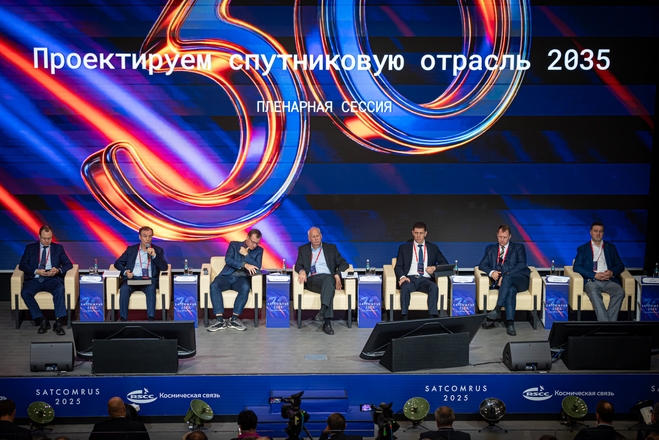Dream Satellite: RSCC General Director Alexey Volin describes the ideal communication and broadcasting satellite at the SATCOMRUS conference
In the future, telecommunication satellites will need to become heavier, transit to a single propulsion system, digital routing, and multi-beam coverage. This was stated by Alexey Volin, General Director of RSCC and Chairman of the Industrial Competence Center (ICC) “Satellite Communications”, at the 30th international conference of operators and users of space telecommunications SATCOMRUS 2025. The event, organized by RSCC, took place on October 2 in Moscow and brought together industry leaders from around the world.
“We tried to imagine what the dream satellite should look like, and we came up with the following recommendations: transitioning to a single xenon-based propulsion system and eliminating hydrazine, which will free up additional mass for payloads. We are also discussing with our colleagues the elimination of the satellite frame on the 2000 platform, which could lead to an additional weight savings of up to 200 kg. A reduction of approximately 30% in the weight of instruments, cables, and structures is also necessary. Furthermore, it would be desirable to standardize equipment and transition to serial production. This is important for reducing spacecraft manufacturing time,” Alexey Volin commented.
Furthermore, it is necessary to transition to digital routing instead of mechanical switching systems: this will improve satellite efficiency. Regarding satellites with flexible payloads, it is worth considering the possibility of switching to multi-beam service areas where necessary.
“We believe that, in the long term, it makes sense for the domestic industry to follow global trends in increasing satellite mass to at least 4-5 tons, which, of course, will require new launch vehicles. This will allow us to add new functionality to satellites in geostationary orbit, which, in turn, will allow us to save on launches,” concluded General Director of RSCC.
TASS is the general media partner of the event.
